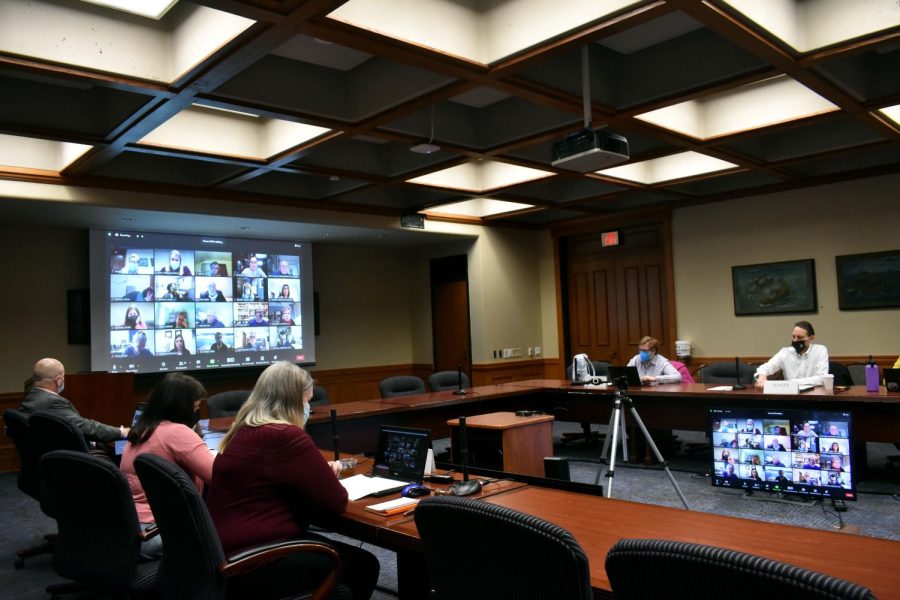Faculty Assembly discusses a potential mask-free fall, passes donor policy
Alyssa Carnevali | Staff Photographer
Pitt Faculty Assembly members discuss a potential mask-free fall 2022 semester on Wednesday afternoon.
February 18, 2022
Pitt’s COVID-19 chief said people have been asking the University to remove the mask mandate for a long time and he tells them the county is in charge of the mask mandate. However, he’s hopeful that they won’t be necessary in the fall.
“I think it’s quite likely that we could be mask free in the fall,” Dr. John Williams, the head of Pitt’s COVID-19 Medical Response Office, said.
Pitt’s Faculty Assembly met on Wednesday to discuss the upcoming fall semester and the University’s changing COVID-19 policies as a result of the high vaccination rate. The Assembly also discussed antisemitism on campus and a new program that offers $10,000 grants to any professor who wishes to create a course about Jewish Studies.
Dr. Williams and Melissa McGivney, the associate dean for community partnerships at the School of Pharmacy, spoke about CMRO updates and what they think the fall semester might look like. Williams, who’s also a professor in the microbiology department, said Pitt is doing relatively well in dealing with COVID-19.
“Case numbers are down in the county around us. Students, staff, faculty numbers are way down. That’s terrific news. Our vaccination rates are fantastic,” Williams said. “Overall student bodies hold a 98% vaccination rate. Almost all of our peers would be very envious of those numbers and they’re very similar in staff and faculty.”
Williams said the CMRO updates will soon begin to focus on severity of cases over the number of cases. During this transition period, Pitt will still conduct contact tracing and enforce its guest policy in the dorms. Williams said the CMRO change is thanks to the high number of fully vaccinated students — meaning the cases are a lot less severe.
Williams said this change in the CMRO report is because the cases are less severe among individuals who have received both doses and the booster.
“There’s going to be at least five times as many Rhinovirus cases among the students,” Williams said. “We don’t care, why? Because they’re mild illnesses and they’re not really disruptive. So that’s what we mean by transitioning from simply counting the numbers.”
Williams said since cases among most students are mild, it’s more important to measure the severity of the cases over the numbers.
“Because when the numbers become really mild, they’re less important. You know, we track car injuries and deaths. Not fender benders. That’s kind of the idea but this is going to be an awkward transition over the next month or two.”
President Robin Kear, a Pitt librarian, held a discussion on antisemitism following elevated concerns on campus.
“Antisemitism is real, and it hurts people. The officers and I condemn any antisemitic comments, analogies, jokes or actions in our community,” Kear said. “These types of comments have no place in an institution of higher education and serve to create an environment that is hostile to learning and harmful to our community, regardless of intention, jokes can cause harm.”
The Jewish Studies department is now offering grants for 2022-23 school year of up to $10,000 to any professor who would like to create a course with Jewish Studies content, or reassembles their course to include more Jewish Studies.
The Assembly also passed the Tenure and Academic Freedom Committee’s policy on “gifts that support projects” with 50 votes in favor and two people abstaining. The policy will outline the donor and donee relationship for donations given to professors. Donors will no longer be able to benefit commercially from the research, have property over it or refuse the outcomes from the research.
Williams thanked the students for their response to the COVID-19 pandemic and getting vaccinated. He attributes the success of Pitt’s vaccination rate to the student’s cooperation and the idea that we are all in this together.
“The students have been incredible,” Williams said. “The secret to the University of Pittsburgh’s success — much better than many of our peers while extending far fewer millions and millions of dollars — has been the students so they’ve been great.”








